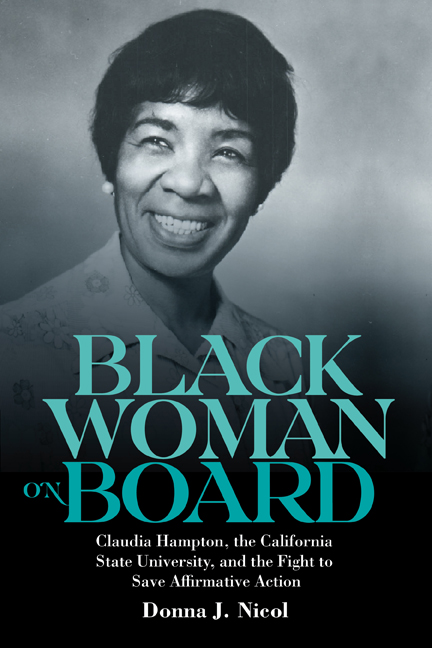 Black Woman on Board
Black Woman on Board Book contents
- Frontmatter
- Dedication
- Contents
- List of Illustrations
- Acknowledgments
- List of Abbreviations
- Introduction: A Very Fortunate Happenstance
- 1 Shifting Notions of the Public Good
- 2 Misgivings about Affirmative Action
- 3 The Conciliator Makes Dinner
- 4 A Hammer in a Velvet Glove
- 5 The Beginning of the End
- Conclusion: The Legacy and The Lessons
- Bibliography
- Appendix: Hampton’s Trustee Committee Service and Leadership
- Index
2 - Misgivings about Affirmative Action
Published online by Cambridge University Press: 09 May 2024
- Frontmatter
- Dedication
- Contents
- List of Illustrations
- Acknowledgments
- List of Abbreviations
- Introduction: A Very Fortunate Happenstance
- 1 Shifting Notions of the Public Good
- 2 Misgivings about Affirmative Action
- 3 The Conciliator Makes Dinner
- 4 A Hammer in a Velvet Glove
- 5 The Beginning of the End
- Conclusion: The Legacy and The Lessons
- Bibliography
- Appendix: Hampton’s Trustee Committee Service and Leadership
- Index
Summary
Campus protests up and down the state did not soften most CSU trustees’ attitudes toward the plight of people of color and women within academia. In many ways, white board member attitudes hardened because of the perceived disruption to the “status quo,” as it did with many ordinary white Californians. In this chapter I examine the varying levels of resistance and opposition to implementing affirmative action within the California State University system from trustees, Chancellor's Office staff, and elected officials. Despite federal and state laws that opened access to insure racial and gender equity in the nation's public colleges and universities, it would be necessary for pro-affirmative action forces to challenge this resistance to guarantee the success of these policies and programs. Even after the loud, rancorous student protests on campuses across the CSU system in the late 1960s, trustees continued to slow-walk enforcement of affirmative action policy until the appointment of Claudia Hampton as the system's first Black woman trustee in 1974. Hampton's appointment to the board was one of several factors that forced the trustees to fully comply with the law after nearly a decade of obfuscation and overt delays.
On the heels of politicized campus protests at San Jose State and San Francisco State, Ronald Reagan, for example, in his position as governor and as a member of the CSU Board of Trustees, used these events as oppor-tunities to pressure the state legislature and trustees to enact policies that greatly expanded the role of law enforcement in the day-to-day operations of the university. Reagan also used his line-item veto power to dramati-cally cut the State College budget, denying requests to increase support for the Educational Opportunity Programs (EOP) which directly benefited racial minority and economically disadvantaged students needing academic counseling, mentoring, and tutoring services in preparation for admissions and retention in the California State Colleges. In 1970, for example, the Governor's budget included only $1.6 million of the trustees’ proposed $4.1 million as compared to the previous year's appropriation of $3.3 million. Trustees’ notes from that period reveal how the reduction in fund-ing to EOP had a devastating impact on disadvantaged students the public was demanding that the State Colleges serve.
- Type
- Chapter
- Information
- Black Woman on BoardClaudia Hampton, the California State University, and the Fight to Save Affirmative Action, pp. 62 - 89Publisher: Boydell & BrewerPrint publication year: 2024


